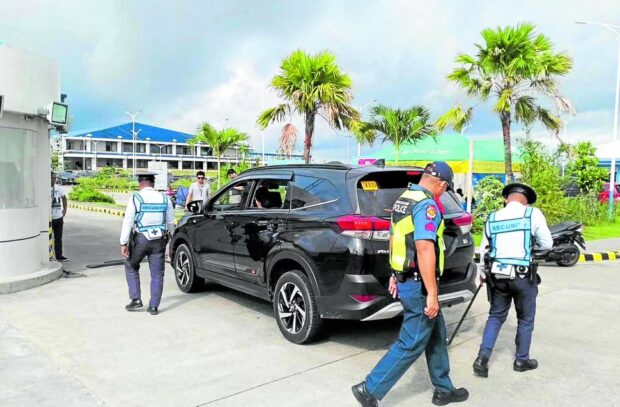
STRICTER THAN USUAL Vehicles undergo inspection at Bicol International Airport complex in this photo released by the Civil Aviation Authority of the Philippines on Friday, as it placed 42 airports under its jurisdiction on high alert.
Airline passengers may have to bear with longer queues and more rigorous pat-downs and luggage checks, after airports across the country were placed on high alert on Friday due to bomb threats received by aviation authorities.
In a statement, the Civil Aviation Authority of the Philippines (Caap) said the alert level was raised “following a warning received by the Air Traffic Service via email that aircraft from Manila bound for Puerto Princesa, Mactan-Cebu, Bicol and Davao International Airports are about to be set off by a bomb.”
“While the information is currently under validation, immediate enhanced security measures are being implemented across all airports,” Caap added.
The emails were received on Oct. 4, the Inquirer learned.
On the same day, Ricardo Banayat, Caap assistant director for security and intelligence service, issued a memo directing airport officials to augment security personnel.
The memo covers the 42 airports being operated by Caap, including the international airports of Kalibo, Laoag, Puerto Princesa and Iloilo.
The international airports in Manila, Clark, Cebu, Davao are operated by other agencies under the Department of Transportation, which were expected to issue similar directives for increased security.
Caap said it was coordinating closely with the military and the police to intensify intelligence and monitoring operations.
In a phone interview on Friday, Caap spokesperson Eric Apolonio said the agency decided to belatedly announce the heightened alert status “to avoid causing panic among the public.”
Bomb search
Apolonio noted that tighter security measures were also enforced at airports last week in response to threat scenarios.
On Oct. 2, Bicol International Airport was shut down for hours after a crumpled piece of paper left inside a Cebu Pacific plane was found to have the word “Bomb?” scribbled on it.
An ensuing bomb search proved negative, but the shutdown affected 12 flights.
The next day, Oct. 3, police officers clashed with suspected New People’s Army rebels in Barangay Alobo, Daraga, Albay province, at the junction of the national highway and access road going to the Bicol airport.
At 6:18 a.m. on Oct. 4, Caap received an email message from a sender identified as “pilipinas kong mahal,” saying “may sasabog na eroplano sa Naia ngayon (a plane will explode at Naia today).’’ Naia stands for Ninoy Aquino International Airport, the country’s main gateway in Manila whose four terminals serve more than 60,000 domestic and international passengers on some 400 flights daily.
The email also contained a purported timetable for explosions at the Bicol, Puerto Princesa and Cebu international airports on that day.
‘No expected impact’
Apolonio said the latest bomb threat was being investigated with the help of cybersecurity experts from the Department of Information and Communications Technology.
Despite the intensified security, Apolonio said, the country’s airports will continue normal operations, but departing passengers—especially on international flights—are advised to be at their airport at least three hours before their takeoff.
Transport Secretary Jaime Bautista said patrols had been increased and K-9 units deployed at all terminals of Manila’s international airport, and law enforcement agencies were coordinating closely.
“There are no expected impact to any scheduled flights and we would like to ensure the traveling public that protocols are in place to ensure everyone’s safety and security,” Bautista said in a statement.
Making bomb threats are punishable under Presidential Decree No. 1727 by up to five years and a fine of P40,000. Offenders may also be charged under the Anti-Terrorism Act of 2020, which imposes a 12-year prison term.